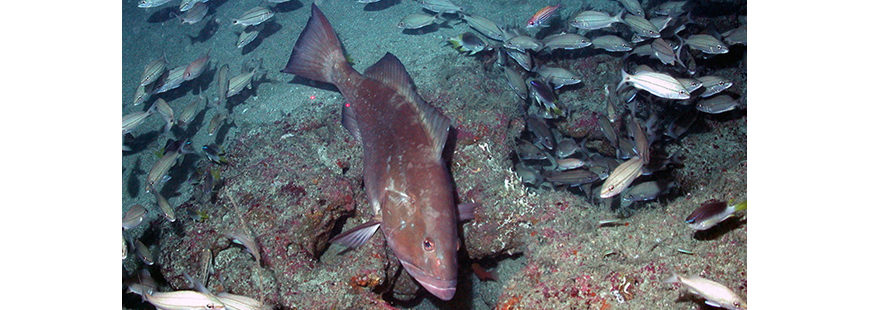Red Grouper photo courtesy of Wikipedia
The majority of media and political attention is focused on red snapper, but there are several other reef fish in the Gulf of Mexico that are of commercial and recreational importance. Commercial fishermen in the Gulf, especially the eastern Gulf, rely on red grouper to make a living. Unfortunately, in the last few years, we are catching less grouper, well below the annual quota. Fishermen are putting our heads together to independently address this issue instead of waiting for politics and management to catch up.
Based on the successful red snapper individual fishing quota (IFQ) program in the Gulf of Mexico, grouper and tilefish fishermen developed our own IFQ program in 2010. The program has been successful in eliminating derby fishing, stabilizing fishing seasons, and increasing safety at sea. Landings of red grouper increased from 2.9 million pounds with 50% quota utilization in 2010 to 5.6 million pounds and 99.5% quota utilization in 2014. Increased quota and better utilization was accompanied by increasing dockside prices as well. But since 2014, landings have decreased, and we are concerned that there may be issues with the grouper population. In 2017 the Gulf Council approved a two-million-pound increase, despite concerns from commercial fishermen who in the same year were only able to land less than half of their allotted quota. Why?
The question “Why?” when it comes to fisheries is never simple to answer. Are red grouper populations decreasing? Are we catching less red grouper because the red snapper population has expanded as it recovers? Are fewer red grouper being caught because snapper beat them to the bait, or have they pushed red grouper out of historical areas? Are environmental factors, such as red tide, at play? Are all these factors acting together to result in lower commercial grouper landings?
Each of these questions has a suite of answers and consequences. Thanks to successful management under the Magnuson-Stevens Act, red snapper populations are rebounding and their range is expanding. While this is good news for the stock (which has traditionally been harvested from the Western Gulf), it poses a challenge for us red grouper fishermen in the Eastern Gulf who are encountering more red snapper than we may have quota for. Since the IFQ is a completely accountable fishery, every pound of IFQ fish we land must be counted and deducted from our quota. If we do not have quota, we cannot land the fish. Throwing fish overboard is not something a fisherman wants to do, especially for a species whose stock is still rebuilding. It’s ecological waste, as well as an economic waste for a fish that has market value. We don’t believe in taking this quota from the red snapper fishermen (hurting one group to help another is a non-starter for us), so some of us are working with a fishermen-developed community quota program called the Reef Fish Quota Bank in order to help reduce our discards.
Research indicates that red tides have impacts on red grouper populations. The most recent stock assessment linked a red tide event in 2005 to declining indices of abundance for red grouper. In 2014, there was another bad red tide event, which was a major factor in the declining red grouper population. 2014 was the same year commercial fishermen started landing less fish. And now, another red tide is impacting Florida’s coast, and fishermen are concerned that this will negatively impact a stock that still hasn’t completely recovered from the last one. However, in my area I am starting to see a good number of juvenile red grouper, which is encouraging.
Not only do we have to worry about our concerns on the water, but also we have to worry about politics on land impacting our businesses. Harmful legislation, such as H.R. 200 and S. 1520 use the guise of “flexible management” to push an agenda that will relax a system based on science that has elevated the U.S. as a leader in fishery management. On a regional level, any time the commercial sector does not land its quota, political pressures begin to ramp up from radical recreational fishing lobbying groups who push for reallocating commercial fishing quota and gifting it to recreational fishermen. Why would these radical groups push for more lax management and reallocation when even recreational fishermen in the Gulf could only catch 35% of their quota in 2017?
Industry-driven solutions, like the Reef Fish Quota Bank, have been helpful to grouper fishermen by leasing us allocation to cover red snapper discards. With some allocation to my name, I can bring incidentally harvested snapper to the dock and not waste them. Additionally, despite Congress’ attempts to dismantle the current fisheries management system by passing H.R. 200, the Magnuson-Stevens Fishery Conservation and Management Act already grants the managers and scientists the flexibility to begin addressing concerns over red grouper. In the last few weeks, the Gulf Council has been asking for input from fishermen to report any changes they are seeing on the water regarding red grouper, so that it can be incorporated into the stock assessment beginning this fall. Fishermen want to lend their experience to scientists and managers, but often feel frustrated that their expertise and observations from almost immeasurable hours on the water are dismissed. The Council putting out a call like this is a signal that management is listening and could make strides improving fishermen-scientist relationships.
Solving the problem of a declining of red grouper population is not going to be an easy task, but I have confidence that our collaboration between industry, scientists, and managers, together with the best-available science mandated by Magnuson-Stevens, can successfully recover the red grouper fishery.



I have fished out of Johns Pass for 30 plus years. The last four years have been the worst I have ever seen. I hope it’s not too late for us to fix. I wonder if the Lion fish might be part of the problem?